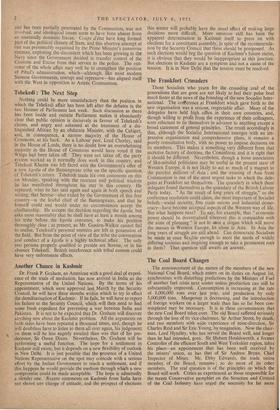The Frankfort Crusaders
Those Socialists who yearn for the crusading zeal of the generations that are gone are not likely to feel their pulse beat much faster at the news of the founding of the new Socialist Inter- national. The conference at Frankfort which gave birth to the new organisation was a serious, respectable affair. Many of the delegates have held high office. in their own countries, and, though willing to profit from the experience of their colleagues, were reluctant to tie themselves in advance to anything except a broad statement of general principles. The result accordingly is that, although the Socialist international emerges with an im- pressive organisation and comprehensive plans, it remains a purely consultative body, with no power to impose decisions on its members. This makes it something very different from that secretive factory of doctrine, the Cominform, and it is right that it should be different. Nevertheless, though a loose association of like-minded politicians may be useful in the present state of Western Europe, it is not likely to act as much of a magnet to the puzzled millions of Asia ; and the weaning of Asia from Communism is one of the most urgent tasks to which the dele- gates at Frankfort set themselves. The quandary in which these delegates found themselves is the quandary of the British Labour Party today. " As the result of long years of struggle," as the conference resolution could claim, the most important of Socialist beliefs—social security, free trade unions and industrial demo- cracy—have become accepted aspects of the Western way of life. But what happens next? To say, for example, that economic power should be decentralised wherever this is compatible with the aims of planning" is not to win a slogan which will move the masses in Western Europe, let alone in Asia. In Asia the long years of struggle are still ahead. Can democratic Socialism be made at once flexible enough to meet the needs of widely differing societies and inspiring enough to take a permanent root in them? That question still awaits an answer.






















































 Previous page
Previous page